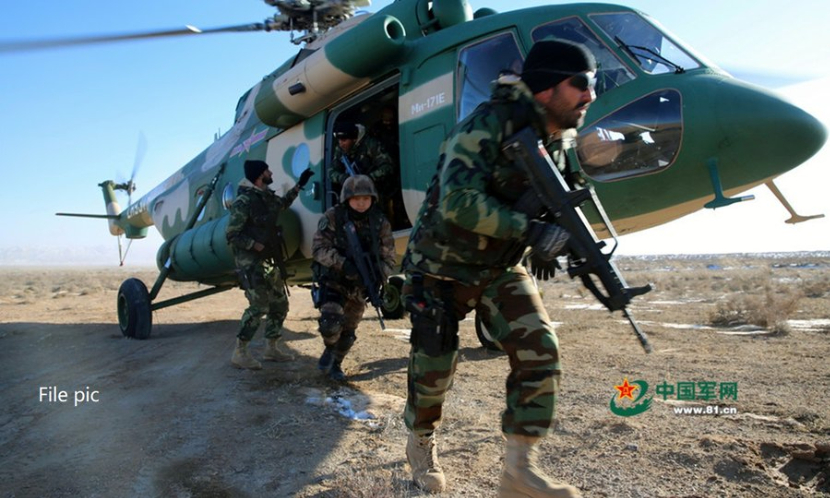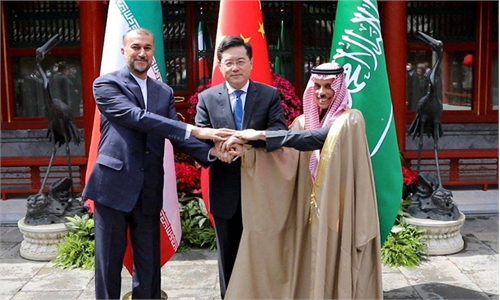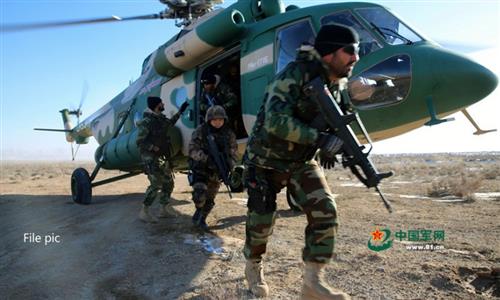China, Pakistan and Iran hold first meeting of trilateral consultation on counter-terrorism, security

Photo: www.81.cn
China on Wednesday held a consultation meeting in Beijing with Pakistan and Iran on counter-terrorism and security, marking the first meeting of its kind.
The meeting creates a more profound institutional mechanism for long-term counter-terrorism cooperation among the three countries, and is likely to also establish a very important foundation for future cooperation in other security areas, experts told the Global Times on Thursday.
Chinese Foreign Ministry spokesperson Wang Wenbin said at the routine press conference on Thursday that "Terrorism is a common enemy of humanity. China firmly opposes and strongly condemns terrorism in all its manifestations. We stand ready to work in close collaboration with Pakistan, Iran and other regional countries to resolutely crack down on terrorist forces that endanger the interests of the three countries and regional security."
During the first meeting of the China-Pakistan-Iran Trilateral Consultation on counter-terrorism and security, which was held at Directors General level, in-depth discussions were held on the regional anti-terrorism situation and joint crackdown on cross-border terrorists, according to the Chinese Foreign Ministry in a statement on Wednesday night.
Based on the outcome of the consultations, the three sides decided to institutionalize the trilateral consultation on counter-terrorism and security.
Bai Tian, director-general of the Department of External Security Affairs of the Chinese Foreign Ministry, Abdul Hameed, director-general of the Ministry of Foreign Affairs of Pakistan, and Seyed Rasoul Mosavi, assistant to the foreign minister and director-general of the South Asia Department of the Ministry of Foreign Affairs of Iran jointly held the meeting.
On the same day, Assistant Minister of Foreign Affairs of China Nong Rong met with Mosavi and Hameed. China also held separate bilateral consultation and exchange on anti-terrorism with Pakistan and Iran.
This trilateral meeting marks an expansion of China's multinational security cooperation mechanisms in the neighboring region, Zhu Yongbiao, director of the Center for Afghanistan Studies at Lanzhou University, told the Global Times on Thursday.
The participation of Iran in such mechanisms is greatly important for the continuation and further deepening of the mechanisms, he said.
In May, China also held trilateral talks with Pakistan and Afghanistan in Islamabad on the 5th China-Afghanistan-Pakistan Foreign Ministers' Dialogue, during which cooperation on counter-terrorism was also discussed.
Zhu noted that the addition of Iran to the cooperation mechanisms is significant from a geographical perspective, as the counter-terrorism situation in Pakistan and Afghanistan could also affect Iran.
"For example, terrorists in Pakistan and Afghanistan have been crossing borders to hide in Iran, which also poses a threat to Iran itself," he said. "In the face of the current, more complex needs of fighting terrorism in South and Central Asia, it is natural for the three countries to strengthen cooperation."
The agenda of Wednesday's meeting is likely to have included issues regarding the security situation in and around Afghanistan, which is of great regional and international concern, and the situation on the Pak-Iran border in the Balochistan region, observers noted.
According to the Samarkand Declaration issued in April at the 4th Foreign Ministers' Meeting of neighboring countries of Afghanistan in Samarkand, the Republic of Uzbekistan, all parties acknowledged that the security situation related to terrorism in Afghanistan remains grave, pointing out that terrorist organizations in Afghanistan, including "Islamic State," the "East Turkestan Islamic Movement" and "Tehrik-e-Taliban Pakistan" continue to pose serious threats to regional and global security, and agree that anti-terrorism security cooperation among neighboring countries of Afghanistan should be strengthened and that a united front against terrorism should be established.
Zhu said that China, Pakistan and Iran are likely to reach many common positions on counter-terrorism, such as joint identification of some terrorist organizations and enhanced cooperation in combating cross-border terrorist operations.
"There could also be more integrated and practical cooperation exercises, such as training and exercises for counter-terrorism technicians," he said.



